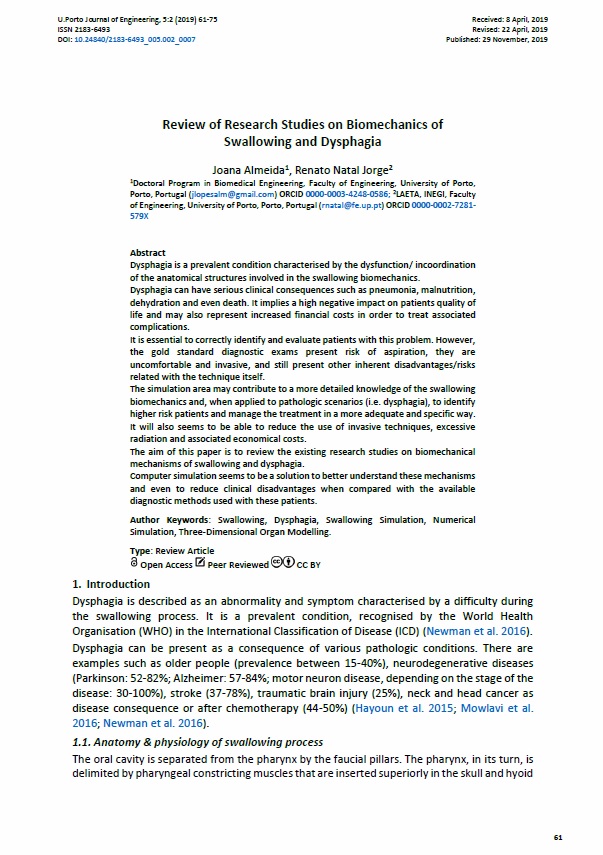Review of Research Studies on Biomechanics of Swallowing and Dysphagia
Main Article Content
Abstract
Dysphagia is a prevalent condition characterised by the dysfunction/ incoordination of the anatomical structures involved in the swallowing biomechanics.
Dysphagia can have serious clinical consequences such as pneumonia, malnutrition, dehydration and even death. It implies a high negative impact on patients quality of life and may also represent increased financial costs in order to treat associated complications.
It is essential to correctly identify and evaluate patients with this problem. However, the gold standard diagnostic exams present risk of aspiration, they are uncomfortable and invasive, and still present other inherent disadvantages/risks related with the technique itself.
The simulation area may contribute to a more detailed knowledge of the swallowing biomechanics and, when applied to pathologic scenarios (i.e. dysphagia), to identify higher risk patients and manage the treatment in a more adequate and specific way. It will also seems to be able to reduce the use of invasive techniques, excessive radiation and associated economical costs.
The aim of this paper is to review the existing research studies on biomechanical mechanisms of swallowing and dysphagia.
Computer simulation seems to be a solution to better understand these mechanisms and even to reduce clinical disadvantages when compared with the available diagnostic methods used with these patients.
Downloads
Article Details
Authors who publish with this journal agree to the following terms:
- Authors retain copyright and grant the journal right of first publication with the work simultaneously licensed under a Creative Commons Attribution License that allows others to share the work with an acknowledgement of the work's authorship and initial publication in this journal.
- Authors grant the journal the rights to provide the article in all forms and media so the article can be used on the latest technology even after publication and ensure its long-term preservation.
- Authors are able to enter into separate, additional contractual arrangements for the non-exclusive distribution of the journal's published version of the work (e.g., post it to an institutional repository or publish it in a book), with an acknowledgement of its initial publication in this journal.
- Authors are permitted and encouraged to post their work online (e.g., in institutional repositories or on their website) prior to and during the submission process, as it can lead to productive exchanges, as well as earlier and greater citation of published work (See The Effect of Open Access).

